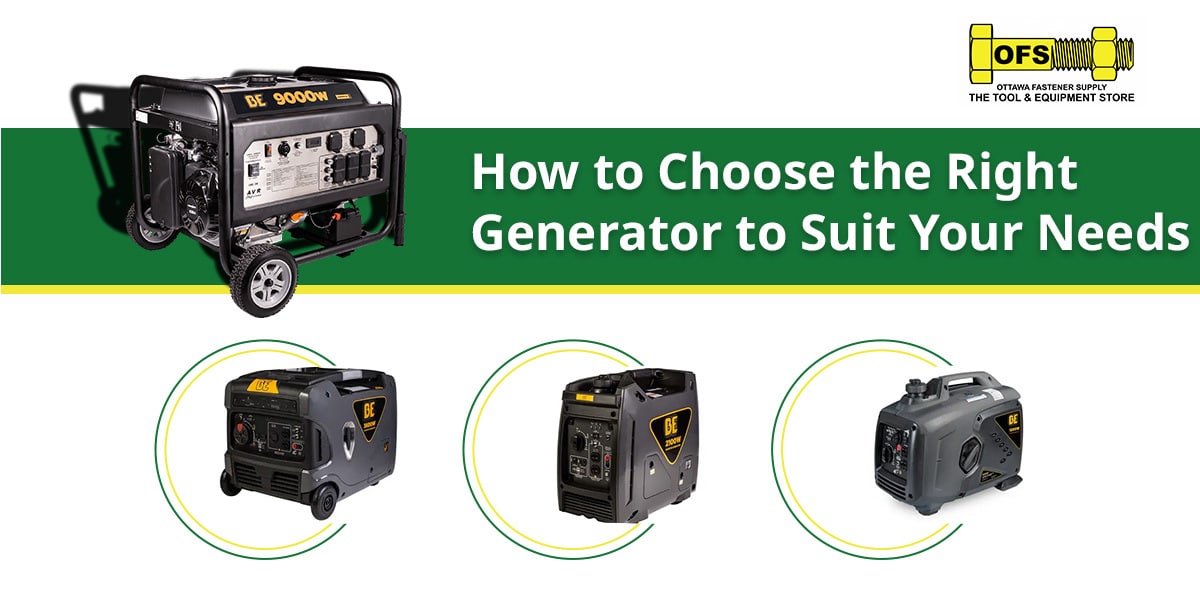When buying a generator, you have a wide choice of top brands from industry leading manufacturers. They come at different price points and have a variety of features and functions. It helps to know you are getting the best one for your unique needs. For example, recreational use at a campsite will be much different than trying to keep your frozen foods cold during an extended power outage. A construction crew has a distinct set of requirements and may need multiple generators working simultaneously. If you have space limitations, a reliable generator for critical loads in a compact size may be essential. Once you know the factors to consider, you will be better equipped to find the best power generators in Ottawa to suit your needs. At Ottawa Fastener Supply, we have high performance generators from BE Power Equipment and King Canada, among other top brand names.
The Right-Sized Generator for Home
Emergencies, Outdoor Recreation Time, or the Job Site
Knowing what
size generator you need starts with some basic questions and
considerations:
1. The types
of appliances to be run. What types of appliances do you want to
operate even when the power goes out? For example, the refrigerator may be the
first to come to mind. You may also want to charge phones, flashlights, or
emergency radios. Some campers enjoy having a generator
to run electronics while out in the woods. Contractors need to run drills,
jigsaws, and other power tools.
2. What
wattage do the appliances require? After determining what machines or
tools need power, you need to know the wattage each requires to start and run.
These two ideas are different. The run wattage refers to how much energy is
necessary to keep the item on. The start wattage is how many watts the item
requires to start up. Every time your refrigerator’s compressor kicks in, it
takes more power. The best source for this information will be your owner’s
manual or the item itself.
3. Add all the
wattage amounts and margin in a little extra. You don’t need to go
overboard buying the largest generator available. It would help if you had
enough to cover the wattage required to start up and run your chosen appliances
or tools and add a little more. This extra space helps curtail the potential
overloading of the circuits in your home or commercial space. For instance,
during emergencies, you may want to run your refrigerator, a lamp, a fan, and a
radio. Ideally, you don’t want to push your generator over 80% of its maximum
output. Here is how it may break down:
- Refrigerator – 500W to run,
1000W to start
- Lamp – 100W to run, 100W to
start
- Fan – 200W to run, 400W to
start
- Radio – 50W to run, 100W to
start
When you add them up,
you need approximately 2,450 watts of power, minimum.
4. Shop for a
quality generator. These powerhouses come in different styles and
capabilities and run on gasoline or diesel fuel. The most common types include
portable, inverter, and whole house. A portable or mid-sized inverter like
the BE2100I may be the best
solution if you need something for the RV. The KCG-12000GE, a 12,000-watt
gasoline-powered generator, can handle larger appliances at your home.
Buy a High-Quality Generator, Enjoy
Uninterrupted Power Supply
Be prepared for those
inevitable times when the power goes out. Finding the right generator is easier when you contact
our team at Ottawa Fastener Supply. You will discover popular, high-quality
brands like BE Generators, King Canada, and other outdoor power equipment. Our staff is ready to answer all
your questions when you call us today!

No comments:
Post a Comment